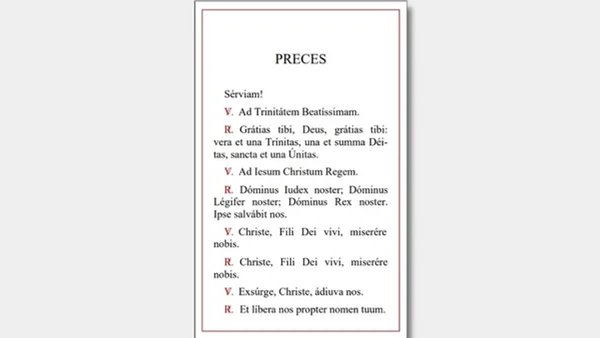🆕 The Preces of Opus Dei (in Latin with a side-by-side English translation) can be found in the Pocket Prayer Book, together with a selection of other prayers and doctrinal texts. The prayer book can be accessed in multiple languages on any device, including offline. Go directly to the Preces.
On 10 December 1930, St. Josemaría wrote in his Intimate Notes: “These days we are making copies of the Prayers to Be Recited by Members of Opus Dei. They have been approved by my confessor. It is obvious that God – because this is the way it has to be in the Work – has wanted us to begin with prayer.”[1]
These words of the founder of Opus Dei are a faithful reflection of his constant teaching: “prayer is the foundation of the spiritual edifice,”[2] of all supernatural work and any apostolic action; it is an indispensable means to advance in the struggle for holiness.[3] In Opus Dei, a practical way to fulfil this need – common to all Christians souls[4] – is provided by these Preces (plural of the Latin word prex: prayer, supplication). Every day, the faithful of the prelature raise their hearts to God through this set of prayers in which they praise, thank and petition God the Father, through Jesus Christ in the Holy Spirit, for their own needs and those of others. In this way, within this small part of the great family of God which is the Church, the scene from early Christianity which St Luke writes about is repeated: all these, with one mind, gave themselves to prayer, and there was one heart and soul in all the company of believers.[5]
St. Josemaría composed these prayers during the first decades of the life of Opus Dei, using texts from Scripture and the Liturgy of the Hours. Through their daily recitation of the prayers, the faithful of the prelature give thanks to God for the gift of their Christian vocation, and show their total availability to do God’s Will. The Preces begin with the expression Serviam! which summarises the resolution to serve God and promote the extension of His Kingdom throughout the world, without discrimination of any kind. Hence after addressing words of praise and thanksgiving to the Blessed Trinity, the faithful of the Work go ad Iesum Christum Regem , to Jesus Christ the King, who sends them out in order to open up for all men and women the divine paths of the earth.
Placing themselves under the protection of the most merciful God, with invocations from Psalm 27 (26) – the Lord is my light and my salvation, whom shall I fear? – they also have recourse, with affection and filial confidence, to the intercession of the Most Blessed Virgin Mary, mediatrix of all graces; St. Joseph, patron of the universal Church; the Holy Guardian Angels, on whose feast Opus Dei was born; and St. Josemaría. The invocation to St. Josemaría was added on 17 May 1992, after his beatification, and was slightly modified on 6 October 2002, when he was canonised by Pope John Paul II.
The Preces then include a number of petitions: firstly, as is natural, for the Holy Father, so that God may keep him, give him life, and make him happy on earth; and then for the bishops of the different dioceses. Next comes a prayer for unity in the apostolate, following the example of Christ at the Last Supper – that they all may be one, as You, Father, are in me and I in you – and for all those who, out of love for God, cooperate in the apostolic activities of the Prelature.
In continuity with these petitions for the pastors of the Church, the next prayer is for the Prelate of Opus Dei, familiarly called “Father,” whom God has placed at the head of this portion of the People of God. And since it is a family prayer there is also a petition for the other faithful of the prelature: those still alive and those who have died.
In the concluding prayers, the faithful invoke God once again in the certainty of being heard, and trusting in his mercy they ask him that their hearts and their very being may be set alight with the fire of the Holy Spirit. They also ask him to bring to completion, through his inspiration and aid, all their actions: their work, their prayer, and the great variety of their occupations. They then ask for joy and peace, which are fruit of the interior struggle, as well as a time for true penance, the grace and consolation of the Holy Spirit, and perseverance in Opus Dei.
Lastly, they turn to the intercession of the Patrons of the apostolates of the Work – the archangels St. Michael, St. Gabriel and St. Raphael, and the apostles St. Peter, St. Paul and St. John. When a priest is present, he gives a blessing, asking that the Lord be in your hearts and on your lips. The prayers end with a greeting that evokes the human and supernatural warmth of the early Christians: Pax, in aeternum (Peace, for ever).
Read or download the full text of the Preces:
[1] Intimate Notes, no. 128, quoted in Vazquez de Prada, The Founder of Opus Dei, Vol 1, Princeton 2002, p. 277.
[2] The Way, no. 83.
[3] cf. 1 Thess 4:3.
[4] cf. Catechism of the Catholic Church, nos. 2744-2745.
[5] Acts 1:14 and 4:32
